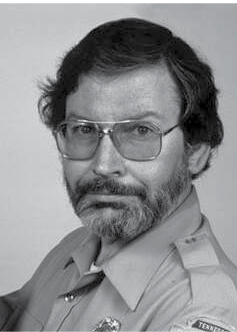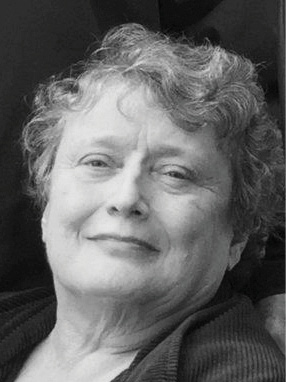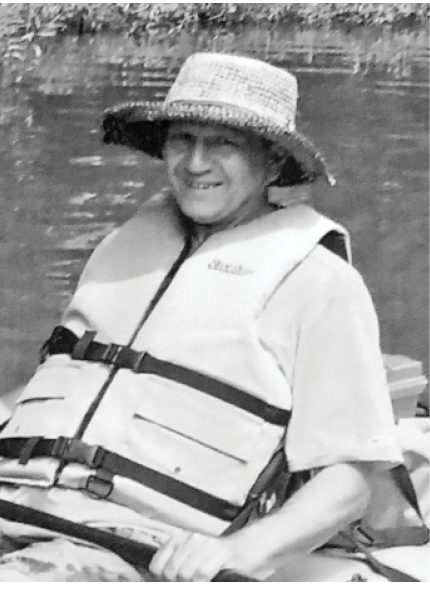Sierra Club and all Tennessee environmental activists mourn the passing of these acivists in 2020.
Their Earth-changing work contributed immensely to improving our environment.
Mack S. Prichard, State Naturalist Emeritus
Nancy McFadden, Urban Environmentalist
Frank Fly: Attorney, Environmentalist and Friend
![]()
Mack S. Prichard, State Naturalist Emeritus
by Randy Hedgepath, Tennessee State Naturalist
 Former Governor Phil Bredesen called Mack Prichard the "conscience of Tennessee Conservation" and Senate Joint Resolution #1007 named him the State Naturalist Emeritus. He worked under eight governors in his more than 50-year career until his retirement in 2008.
Former Governor Phil Bredesen called Mack Prichard the "conscience of Tennessee Conservation" and Senate Joint Resolution #1007 named him the State Naturalist Emeritus. He worked under eight governors in his more than 50-year career until his retirement in 2008.
Mack began his career with Tennessee State Parks at 16 as a seasonal naturalist at Meeman Shelby Forest State Park near Memphis. He also worked at the Chucalissa Indian Mounds in T.O. Fuller State Park in Memphis. As a teenager he was named Vice President of the Memphis Archeology Club. Mack gave a talk in favor of preserving Parkin Mound in Arkansas when he was just 15 years old, which convinced the owner to donate the site for preservation. This initial success led him to become a guide for the parks. His talents soon landed him a statewide position with the Division of State Parks Educational Services. In 1971, Mack helped establish the Tennessee Archeology Division and was the first State Archeologist.
Mack had a hand in starting and preserving nearly half of the areas now designated as state parks. Governor Frank Clement championed a multi-million-dollar parks acquisition fund in the 1960s and Mack was one of the people charged with identifying areas to acquire. He also worked on securing numerous areas for the State Natural Areas system. Notable examples are Savage Gulf, May Prairie, Colditz Cove, and Radnor Lake. The Natural Areas Act of 1971 enabled our system of nature preserves and the first administrator was Mack Prichard
Most conservation and environmental organizations in Tennessee can count Mack Prichard as a founding father or long-term member. The 'Middle Tennessee Conservancy' which became the Nature Conservancy of Tennessee, the Tennessee Trails Association, Tennessee Scenic Rivers Association, and many others had Mack present at their first meetings. If the cause was protecting nature, a healthy environment, and cultural history of our state, Mack was on board. He was on the Board of Directors of the South Cumberland Regional Land Trust, the Tennessee Parks and Greenways Foundation and others.
Mack was a long-term member of the Tennessee Chapter of the Sierra Club. In fact, he was instrumental in establishing it when it was known as the Tennessee Group of the Cumberland Chapter. He told me once he was very glad that I worked with the Sierra Club, leading field trips and doing programs, because, "those folks do really good work." Long-time Sierran Charlie High shares that he first met Mack in the late 1960s when he went to work for the Department of Conservation as a park planner. On his first day tour of Central Office, he met Mack sorting slides for an upcoming program. Charlie's first field trip with Mack was into the Rocky River Gorge to help him mark off an area to protect a huge Tulip Poplar from logging. It seems the timber company that had bought the area had requested Mack do so, because it was believed to be the largest Tulip Tree in the state. Charlie says Mack would show up for Sierra Club outings, sometimes unannounced and later in the trip would wander off on his own, exploring the woods, only to show up at camp in the evening--that was Mack's way.
Mack's greatest legacy may be the numerous people he inspired to work for conservation through his programs and advocacy. Many new employees with the Department of Conservation named Mack as a reason they pursued their career. When I was in college at UT Martin in the 1970s, I first witnessed Mack give a slide talk to the School of Agriculture. He made some folks squirm with his facts about pesticides, made them laugh at his outdoor adventures, and made a few jump out of their seats when he imitated the barred owl at the end and urged them to "give a hoot" for conservation in Tennessee. I came away with a newfound ambition to pursue a career in parks, perhaps as a naturalist with state parks.
Everyone who loves the natural beauty, biological diversity, and fascinating history of Tennessee owes a debt of gratitude to Mack Prichard. Especially those, like myself, who were inspired and trained by him. I may owe him the most because he not only helped save some of my favorite places but also helped make my dream of walking in his footsteps, as State Naturalist, a reality.
Contact Randy at Randy.Hedgepath@tn.gov
![]()
Nancy McFadden, Urban Environmentalist
By Rita Bullinger
 The Sierra Club Tennessee mourns the loss of Nancy Gunderson McFadden who passed away March 28, 2020, in Nashville, Tennessee. Nancy was an active member of the Sierra Club's Middle Tennessee Group Executive Committee.
The Sierra Club Tennessee mourns the loss of Nancy Gunderson McFadden who passed away March 28, 2020, in Nashville, Tennessee. Nancy was an active member of the Sierra Club's Middle Tennessee Group Executive Committee.
Nancy was a person of deep spiritual convictions, kind and straightforward; a special education teacher and ardent advocate for environmental and social justice who worked to make the world a better place. Known for her passion and knowledge, Nancy weighed in on issues pertaining to health care, pesticide misuse, and coal ash. She was also a skillful coalition builder, remembered for her enthusiasm and inclusiveness.
As an environmental activist, in the 1980s, Nancy did all the development and filing work required for the environmental organization Bring Urban Recycling to Nashville Today (BURNT) to qualify as a 501(c)3 non-profit. BURNT was the lead organization advocating for Nashville to shut down its downtown incinerator and institute recycling programs.
Later, Nancy initiated and led a successful campaign to convince Metro Nashville Public Schools to adopt integrated pest management (IPM) practices in order to minimize the use of toxic pesticides in schools and classrooms while also reducing pest infestations. The effort involved bringing in nationally recognized experts to train Metro staff in the practice of IPM. After its success in the schools, Metro Nashville adopted this practice for all their public buildings.
Working with SC and the Tennessee Environmental Council (TEC), she also successfully advocated at the Tennessee State Legislature for the rights of localities to retain local control over pesticides. For all these efforts TEC awarded Nancy the Environmental Health Advocate Award in 1994.
Those of us who knew Nancy remember her as an avid reader and researcher of issues that impacted the environment and people's health. She regularly shared these resources with the members of the Tennessee Chapter Sierra Club via their internal communications tools. "Members looked forward to receiving and reading her informative posts," recalls Gary Bowers, Chapter Communications Coordinator. "Her acuity and acumen for this communication was highly valued and will be greatly missed."
Scott Banbury, the Tennessee Chapter's Conservation Program Coordinator, first met Nancy when she was working with Bring Urban Recycling to Nashville Today (BURNT). He recalls, "She really understood what it took to be a change-making public citizen. Nancy attended public meetings and engaged in the organizational work that promotes the public good. I thought of Nancy as my conscience. Hardly a week went by in the 20 years I knew Nancy that she didn't reach out to me personally to make sure I was aware of important national, state, and local environmental and social justice issues impacting Tennessee," Scott says. "Often, she inspired me to take on issues I may have otherwise overlooked. I miss her already."
Nancy volunteered for the League of Women Voters and Catholic Charities in support of their refugee work. She also worked with the president of Physicians for Social Responsibility to arrange for Grand Rounds environmental health speaking engagements, one with Dr. Bill Reid, at both Meharry and Vanderbilt Hospitals.
The Middle Tennessee Group welcomed her recent addition to the Tennessee Executive Committee and appreciated her activity in areas and issues that were her passion.
In the words of Rita Harris, Sierra Club National Board Member, "I remember Nancy vividly. She was dedicated and very knowledgeable about integrated pest management and I recall her pushing the concept in the Memphis City School system. I'm so sorry to hear about her passing."
Nancy is survived by her husband of 46 years, Jack McFadden, their daughter, son, and two grandchildren.
Contact Rita at ritabullinger@gmail.com
![]()
Frank Fly: Attorney, Environmentalist and Friend
by Joe W. McCaleb, Attorney at Law
 I first met Frank in the late 1970s just as he was engaging the Tennessee Valley Authority (TVA) in a legal battle to stop the proposed Columbia Dam and defend the Duck River and surrounding lands, part of which was Frank’s boyhood home. Frank loved the Duck River, and as a boy he canoed it, swam in it and explored many of its tributaries as well as the woods in its watershed.
I first met Frank in the late 1970s just as he was engaging the Tennessee Valley Authority (TVA) in a legal battle to stop the proposed Columbia Dam and defend the Duck River and surrounding lands, part of which was Frank’s boyhood home. Frank loved the Duck River, and as a boy he canoed it, swam in it and explored many of its tributaries as well as the woods in its watershed.
Frank demonstrated his love for nature both as a long-time member of the Sierra Club and in his practice of the law. Details are fuzzy because it has been so many years, but I joined Frank’s legal team sometime after January 1977, after I left the employ of Tennessee as its first environmental lawyer. The other lawyer on Frank’s team was Jim Tripp, attorney for the Environmental Defense Fund. In the ensuing months, we experienced defeat after defeat in the various administrative boards and courts, but Frank never gave up and took the fight to TVA and its political allies in both the courts and the public arena. The biggest plum in that fight was Frank’s television appearance on 60 Minutes detailing all of the reasons the land around the beautiful Duck River at Columbia, Tennessee, should not be inundated and 12,000 marginal acres placed under TVA’s control. In the end, Frank and his team delayed the final construction of the dam too long for TVA’s original Final Environmental Impact Study to remain effective. As a result, TVA was required to prepare a Supplemental Environmental Impact Study which showed that the cost-to-benefit ratio from the construction of the dam was less than 1:1, violating the rules and regulations of both NEPA and TVA. TVA stopped construction of the dam and removed the portion already constructed.
Frank was the chief architect of that victory and, as a result, preserved the Duck River for all the recreation and world-class biological diversity it offers today for Americans. In 1986, Perception Inc., the world’s largest kayak manufacturer, named Frank “River Conservationist of the Year” for the United States.
Afterwards, Frank returned to his law practice in Murfreesboro and became a founding partner of Bulloch, Fly, Hornsby & Evans. I began a law practice in Hendersonville, Tennessee, and from time to time, Frank and I communicated on various environmental cases. Frank became proficient in land use cases, many involving different aspects of our natural environment.
In 1996, Frank and I began to work more closely on cases primarily involving the federal Clean Water Act (CWA). We commented on Environmental Assessments filed by federal agencies and filed lawsuits in Federal District Court to enforce provisions of the CWA. We also worked together on state permits issued pursuant to the Tennessee Water Quality Act of 1970. Of course, as with all attorneys, we each also carried individual case loads. Frank was always a fierce advocate for his clients and rarely, that I recall, conceded defeat.
When not practicing law, Frank hiked, biked and kayaked on his favorite river. He was also an accomplished tennis player and won several tournaments, including the Knoxville City Championship one year. He became a mentor to young tennis students in clinics as well as young lawyers seeking his advice.
Sometime after 2009, Frank mysteriously became afflicted with ALS, also known as Lou Gehrig’s disease. But even as this disease progressed, he continued his law practice, sometimes from his historic home, Farmington, just outside Murfreesboro, and continued other activities as much as the disease allowed. My wife Glenda and I visited Frank and Suzanne, his wife, twice and each time he showed remarkable determination to accept our visits. On one visit, he recounted a story he told numerous visitors about the friendly ghost that lived in their historic home, and turned pages of a certain book located in their library! Even when Frank discovered the strange phenomenon and turned the page back to its original place, the next morning, the page was turned again. Frank swore it was true, and Suzanne confirmed.
But unfortunately, as the disease progressed, Frank turned away all visitors, even me. On April 29 when I received a phone call from Suzanne, it was a shock. My long-time friend passed away on April 28, 2020. His pain is now gone. I miss him but I know Frank’s spirit is in a beautiful place. Due to the COVID-19 virus, a memorial service will be held to honor the life and service of Frank M. Fly at a later date.
Joe McCaleb became a member of the Sierra Club in 1977 and a lifetime member in 1990. Contact Joe at McCalebJW@gmail.com